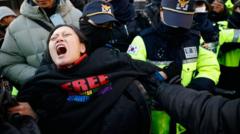Before dawn on Wednesday, a substantial police force of 3,000 officers converged at the fortified residence of suspended South Korean President Yoon Suk Yeol, intent on executing an arrest warrant. This mission, marked by an initial failed attempt, saw investigators using ladders to navigate barricades and bolt cutters to breach barbed wire. Their first attempt resulted in a six-hour standoff as Yoon's extensive security team and his zealous supporters overwhelmingly outnumbered the police, leading them to withdraw after deeming it "practically impossible" to proceed.
As Yoon awaits a decision from the constitutional court regarding his impeachment, questions arise surrounding the factors complicating his arrest. Analysts point to Yoon’s Presidential Security Service (PSS), which had formed a human barrier on an earlier occasion, and suggest that the team may be composed of loyalists appointed by Yoon himself. This loyalty possibly contributed to the resistance they initially displayed; however, during the arrest, some PSS members reportedly chose to remain inside, perhaps deterred by the significant police presence and warned of potential job losses for obstructing legal orders.
Yoon's strong support base further complicates the situation. Thousands of supporters camped outside his residence during the first attempt, showing unwavering dedication and chanting incendiary claims about alleged infiltrations by pro-North Korea forces. This ideological fervor was starkly visible again during the second round of arrests, where confrontation peaked as these supporters reacted emotionally to Yoon's apprehension.
In addition to external factors, the operational strategy of the Corruption Investigation Office for High-ranking Officials (CIO), which is jointly leading the investigation, has come under scrutiny. Critics claim the CIO’s coordination and preparedness were lacking during the initial arrest attempt, branding its performance as an “incompetent” response to a significant historical event—the arrest of a sitting president.
Despite securing Yoon’s arrest ultimately, the CIO faces skepticism about its capacity to handle the investigation effectively. Critics argue that the agency should defer to police authority, given that it lacks the power to charge Yoon, which adds a layer of complexity as the case prepares to transition to state prosecutors.
As South Korea navigates these unprecedented waters, with constitutional implications and the reinvigorated influence of far-right populist elements in politics, the path ahead remains uncertain for both the impeached president and the nation's political landscape at large.

















